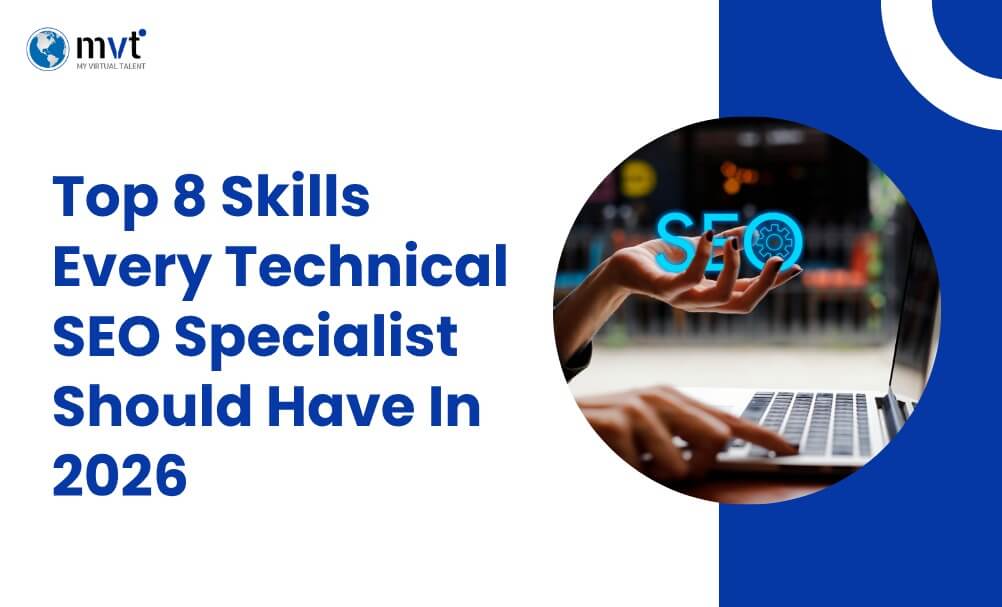
The world of SEO is changing fast. What worked last year might not work today. As search engines use more AI, focus on user experience through Core Web Vitals, and move toward mobile-first indexing, the role of a Technical SEO Specialist has become more advanced than ever.
It’s no longer just about fixing errors or improving page speed. Today’s technical SEO experts design full strategies that prepare websites for the future of search.
The demand for skilled professionals in this field is growing rapidly. By 2026, Technical SEO Specialists will be among the most sought-after roles in digital marketing.
This isn’t just about finding a job; it’s about building a long-term career in a field that continues to evolve with technology.
This guide will cover the eight most important skills every technical SEO expert needs to master, with real examples and easy, practical tips to help you stay ahead.
The Evolution of Technical SEO
Search engines like Google are now smarter than ever. They no longer rely only on keywords; instead, they use AI and machine learning to understand the meaning, context, and intent behind every search. This shift has made user experience and technical performance more important than ever.
For a Technical SEO Specialist, this means the job has become more advanced and strategic. It’s not enough to just know traditional SEO, now you must handle JavaScript-heavy websites, optimize Core Web Vitals, and ensure fast, mobile-friendly experiences.
The modern Technical SEO role blends technical development, data analysis, and strategic optimization. To succeed, specialists must understand how websites work at their core while also anticipating future changes driven by AI and user behavior. This balance of tech skill and SEO insight shows today’s most successful experts.
Skill 1: Advanced JavaScript and Modern Web Framework Optimization
The modern web is built on JavaScript. As frameworks like React, Vue, and Angular dominate web development, understanding how to make them search-engine-friendly has become a non-negotiable skill for technical SEOs.
Client-Side vs. Server-Side Rendering
Many JavaScript sites use client-side rendering (CSR), where the browser executes JavaScript to render content. This can be problematic for search engine crawlers, which may not see the full content, leading to indexing issues.
- Server-Side Rendering (SSR): The server renders the page and sends a fully-formed HTML file to the browser. This is ideal for SEO as crawlers receive all content immediately.
- Static Site Generation (SSG): Pages are pre-rendered at build time. This offers excellent performance and is very SEO-friendly.
- Hydration: A technique where a page is initially rendered on the server (SSR) or pre-rendered (SSG), and then the client-side JavaScript “takes over” to make it interactive.
A technical SEO specialist must be able to diagnose rendering issues and recommend the appropriate solution, working closely with development teams to implement SSR, SSG, or dynamic rendering where needed.
Tools and Testing
Use tools like Google’s Mobile-Friendly Test and Rich Results Test to see how Googlebot renders a page. The URL Inspection Tool in Google Search Console is also invaluable for spotting JavaScript-related indexing problems.
Skill 2: Core Web Vitals Mastery and Performance Optimization
User experience is a primary ranking factor, and Core Web Vitals (CWV) are Google’s way of measuring it. By 2026, proficiency in this area will be a core competency for any technical SEO.
Understanding the Metrics
- Largest Contentful Paint (LCP): Measures loading performance. Aim for an LCP of 2.5 seconds or less.
- First Input Delay (FID): Measures interactivity. A good FID is 100 milliseconds or less.
- Cumulative Layout Shift (CLS): Measures visual stability. Keep CLS below 0.1.
- Interaction to Next Paint (INP): A newer metric replacing FID, INP measures overall responsiveness to user interactions. A good INP is below 200 milliseconds.
Advanced Optimization Techniques
A technical SEO should lead performance audits and implement advanced fixes, including:
- Image Optimization: Compressing images and using modern formats like WebP or AVIF.
- Lazy Loading: Deferring the loading of off-screen images and videos until a user scrolls to them.
- Resource Prioritization: Using
preloadandprefetchto tell the browser which resources are critical to load first.
Demonstrating a direct link between performance improvements and SEO gains (like increased rankings and traffic) is a powerful way to show value.
Skill 3: Mobile-First Indexing and Progressive Web App (PWA) Implementation
Google now uses the mobile version of your site to decide rankings and indexing, which means a perfect mobile experience is no longer optional; it’s essential.
A Technical SEO Specialist must go beyond basic responsive design. This includes optimizing mobile menus, ensuring buttons and links are easy to tap, and verifying that mobile content and structured data exactly match the desktop version. Every small detail counts toward mobile usability and search visibility.
Another key area is Progressive Web Apps (PWAs). PWAs offer app-like experiences directly in the browser, including offline access and push notifications. From an SEO perspective, they’re fully indexable and can improve engagement dramatically.
A skilled Technical SEO Specialist should know how to implement PWAs correctly, configure service workers, and ensure the app shell is optimized for crawling and fast loading. Together, these practices help websites perform beautifully on every device.
Skill 4: AI and Machine Learning Integration for SEO
AI is no longer just a buzzword; it is a practical tool that is revolutionizing technical SEO. By 2026, using AI will be standard practice for analyzing data, automating tasks, and formulating strategy.
Leveraging AI Tools
- Large-Scale Analysis: AI can process massive datasets from logs, crawls, and analytics to identify patterns, anomalies, and opportunities that would be impossible for a human to spot.
- Content Optimization: Tools like Jasper use AI to help generate and optimize content, but the technical SEO’s role is to ensure the underlying structure (headings, schema) supports this content.
- Predictive SEO: Machine learning models can be used to forecast the potential impact of SEO changes, helping to prioritize initiatives with the highest expected ROI.
Technical SEO specialists can use AI tools to automate technical audits, classify keywords at scale, and predict crawl budget needs.
Skill 5: Advanced Schema Markup and Structured Data Implementation
Structured data helps search engines understand the content of a page and display it in rich, engaging formats in the search results. The use of schema is expanding, and advanced implementation is a key differentiator.
Beyond Basic Schema
By 2026, basic Organization and Article schema will be table stakes. Mastery will involve implementing more complex types relevant to specific industries, such as Product, Recipe, FAQPage, and Event. The key is to use JSON-LD, the format preferred by Google, and to avoid common mistakes like hiding structured data in display:none elements.
Emerging Schema and Validation
Stay ahead of the curve by monitoring emerging schema types from Schema.org. Always validate your implementation using the Schema Markup Validator and Google’s Rich Results Test to ensure there are no errors that could prevent your rich snippets from showing.
Skill 6: International SEO and Technical Globalization
For companies serving customers in multiple countries, international SEO is essential. The technical setup behind it can be complex, which is why having a skilled Technical SEO Specialist is so important.
Hreflang Implementation, URL Structure, Content Delivery Network (CDN)
One key task is hreflang implementation, which helps search engines display the correct language or regional version of your website to each user. Setting it up properly, and auditing it regularly is crucial to avoid duplicate content or ranking issues.
Another important area is URL structure. A Technical SEO Specialist must decide whether to use subdomains (de.example.com), subdirectories (example.com/de), or country-specific domains (example.de). Each choice affects SEO performance and site maintenance differently.
Lastly, using a Content Delivery Network (CDN) can greatly improve site speed for international visitors. The specialist also configures geo-targeting in Google Search Console to ensure the right audience finds the right version of your website.
Skill 7: Log File Analysis and Advanced SEO Data Interpretation
Server logs keep a record of every request made to your website, including each visit from Googlebot and other search engine crawlers. For a Technical SEO Specialist, this information is extremely valuable because it shows exactly how search engines interact with your site in real time.
By analyzing these logs, a Technical SEO Specialist can perform crawl budget optimization, finding out which pages are crawled most often, how frequently bots visit, and whether crawl time is being wasted on unimportant URLs like redirects or duplicate content. This ensures that high-value pages get indexed faster and more efficiently.
Tools such as Screaming Frog Log File Analyser, Splunk, or even custom Python scripts make it easier to process large log files and extract actionable insights. When mastered, log file analysis helps identify hidden crawl errors, improve site performance, and increase overall search visibility.
Skill 8: Security, Privacy, and Technical Compliance
Security and privacy are no longer just IT concerns; they have direct and significant impacts on SEO.
HTTPS and Security Headers
HTTPS is a confirmed ranking signal. A technical SEO must ensure a site-wide HTTPS implementation is flawless, with no mixed content issues. Beyond that, implementing security headers like Content Security Policy (CSP) can protect users and build trust, that indirectly benefits SEO.
Privacy Regulations (GDPR, CCPA)
Regulations like GDPR in Europe and CCPA in California dictate how websites must handle user data and obtain consent for cookies. A technical SEO must understand the technical implications of these rules, ensuring that cookie consent banners do not impede crawling or negatively affect Core Web Vitals.
Essential Tools and Technologies for 2026
To master these skills, a technical SEO needs a robust toolkit. Here are some essentials:
- Crawlers: Screaming Frog, Sitebulb, OnCrawl
- Performance: Google PageSpeed Insights, GTmetrix, WebPageTest
- Log Analysis: Screaming Frog Log File Analyser, Splunk, ELK Stack
- JavaScript SEO: Google’s Mobile-Friendly Test, Puppeteer for rendering tests
- Structured Data: Schema.org, Google’s Rich Results Test, Schema Markup Validator
- AI Tools: Custom Python scripts, various emerging platforms for data analysis and automation.
Building Your Career as a Technical SEO Specialist
Mastering these skills opens exciting career opportunities for any Technical SEO Specialist from senior-level positions to roles like Head of SEO or Technical Consultant.
Demonstrate Your Skills: Build a portfolio of real-world projects that showcase how you solved complex SEO issues, improved site performance, or boosted organic traffic. Add clear before-and-after metrics to highlight your impact on visibility and revenue.
Continuous Learning: SEO evolves quickly. Stay updated by following trusted blogs like Moz, Ahrefs, and Search Engine Journal. Engage in online communities such as Reddit’s r/techseo, and test new ideas regularly to stay ahead of algorithm updates.
Certifications: While hands-on experience matters most, certifications from platforms such as Google, HubSpot, or SEMrush Academy may strengthen your credibility.
With the right combination of skills, learning, and practical results, a Technical SEO Specialist can build a long-lasting and better career in digital marketing.
Your Roadmap to Technical SEO Mastery
Becoming a successful Technical SEO Specialist in 2026 is both challenging and rewarding. The eight key skills, from Core Web Vitals optimization and JavaScript rendering to AI integration and security compliance, form the backbone of a strong, future-ready career.
Don’t feel pressured to learn everything at once. Begin with one area that truly interests you or applies to your current work. Build a test website, experiment with tools, and analyze your results. The best learning happens through consistent, hands-on practice.
As you grow your expertise, you’ll not only stay ahead of search engine changes but also become a valuable asset to any company that depends on organic visibility.
If you’re ready to level up your SEO career, consult MyVirtualTalent today. Our team can help you build the technical skills, real-world experience, and career path needed to thrive as a Technical SEO Specialist in the evolving digital landscape.
Looking for fresh content?
Get articles and insights from our weekly newsletter.
Recent Posts
Reduce Your Marketing Spend By 70% And Grow Your Revenue Organically 10X Faster!
Get a Free Quote Today!










